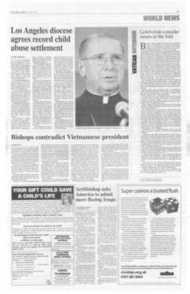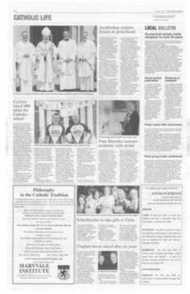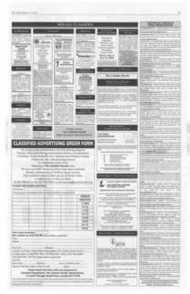Page 3, 20th July 2007
Page 3

Report an error
Noticed an error on this page?If you've noticed an error in this article please click here to report it.
Tags
Share
Related articles
Government Admits That Doctors Are Turning Their Backs On...
Catholic Peer Collapses In Lords ' After Criticising...
Pro-life Peers Fail To Derail Embryology Bill
Catholic Peer Criticises Parliamentary Inquiry , Into...
Marie Stopes Opens Chain Of Abortion Clinics In China
Minister says morality should Philosopher outlines challenges not drive Britain's abortion policy of aggressive secularism in politics
BY MARK GREAVES
MORAL considerations should not affect policy on abortion, a Government • Minister has said.
Baroness Royal' of Blaisdon, a Labour Whip in the House of Lords and a Government spokesman on health and international development, was asked in Parliament whether she "really meant" that morality should not drive abortion policy.
She replied: "My Lords, where issues such as abortion are concerned, yes, I did mean it very firmly."
The Baroness made her comments as she defended the Government's vigorous support of family planning in Africa.
She said that Britain was "leading the world" in terms of sexual health and "reproductive rights" — often a euphemism for the right to abortion.
She paid tribute to the Government's efforts to lobby for a global target for abortion and contraception to be available to all by 2015.
"It is thanks to this Government that we now have a universally accepted target for sexual health and reproductive rights.
"This Government has done an excellent job, although I well recognise that it is important to keep family planning at the heart of development policy," she said.
Baroness Royall told peers that in 2006 the Government gave £25.1 million to the United Nations Population Fund and £75 million to the International Planned Parenthood Federation, both of which work to provide access to abortion and contraception.
The Baroness's comments came weeks after the Commons' Science and Technology Committee announced an inquiry into abortion law that would exclude any consideration of moral issues.
Instead the inquiry will examine the impact of scientific advances on various aspects of abortion legislation, including whether the 24-week limit should be reduced because more babies survive late abortions.
Lord Alton of Liverpool, a Catholic crossbench peer, said the separation of abortion from morality was "a very disturbing trend".
He said: "The argument is becoming increasingly commonplace and it needs to be challenged at every opportunit. "Ity says something about the insecurity of some of the proponents of abortion that they don't want to go near these ethical arguments.
"In a country that routinely aborts 600 babies a day surely it's not unreasonable to expect a wide-ranging public debate about the issue."
Paul Danon, a spokesman for the Society for the Protection of Unborn Children, said: "Would one call for the abandonment of morality in other spheres of public policy such as discrimination, the availability of medicine or the use of military force'?"
Mr Danon argued that the West's promotion of abortion and contraception on the developing world was "grotesquely imperialist".
He said: "Britain should put its house in order and encourage true respect for human life rather than exporting its culture of death.
Mr Danon added: "This is another example of the West trying to foist its failed population policies on the developing world and to stir up an interest in such practices among people to whom this is often culturally hostile."
BY ANNA ARCO
CHRISTIANS need to respond to the rise of anti-religious secularism that is permeating even into Government policy, Professor John Haldane said last Saturday in a speech about the challenges and opportunities facing Christians in Britain today.
The Professor of Philosophy at the University of St Andrews and author of Faithful Reason: Essays Catholic and Philosophical, spoke at a conference hosted by the Catholic Truth Society in London.
Aggressive atheism as evidenced by the recent slew of mass-market anti-religious books by authors such as Christopher Hitchens and Richard Dawkins is one of the main challenges facing Christians today along with a widespread decline in interest in religion or the search for objective truth, he said.
The Catholic Church in England and Wales but not Scotland, he said, was risking its independence from a secular government as the result of giving into a historical, but in his eyes, unwise temptation to gain access to the corridors of secular power.
According to Prof Haldane, the temptation to delay the public presentation of the Catholic position, with logical and tightly reasoned argument, until the Catholic Church had "arrived" and gained respectability was dangerous and a search for an illusory goal. He put forward the idea that there could be, at present at least, no dialogue with the Anglican Communion, fraught as it is with divisions, for the simple reason that there was no single understanding of what comprises the Anglican faith.
Elaborating on this point, he said that even though Catholics share a cause with Islam in the fight against aggressive secularism, religion ought not be valued in blanket terms. Instead, he said, each religion must be assessed by a "reasoned evaluation of its contents". He suggested that the answers both for the dialogue with other religions and the ecumenical movement would come from looking east.
Prof Haldane is engaged in discussions with the Pastern Orthodox churches and was appointed a consultor to the Pontifical Council for Culture in 2005 where he is involved in evangelising through cultural and intellectual dialogue. There are 27 consultors worldwide.
Prof Haldane spoke from a few handwritten notes.
The speech was recorded and is being transcribed with a view to publication, according to the Catholic Truth Society's General Secretary, Fergal Martin.
blog comments powered by Disqus

















